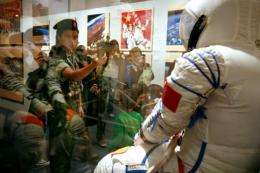US lunar pull-out leaves China shooting for moon

China aims to land its first astronauts on the moon within a decade at the dawn of a new era of manned space exploration -- a race it now leads thanks to the US decision to drop its lunar programme.
US President Barack Obama earlier this month said he planned to drop the costly Constellation space programme, a budget move that would kill off future moon exploration if it is approved by Congress.
In contrast, China has a fast-growing human spaceflight project that has notched one success after another, including a spacewalk by astronauts in 2008, with plans for a manned lunar mission by around 2020.
The turnaround is viewed as yet another example of the Asian power's rising profile and technical prowess.
"Overall, China is behind the US in technology and in actual presence in space -- the US operates dozens of satellites, the Chinese only a few," said James Lewis, of the US-based Centre for Strategic and International Studies.
"The real concern is the trend: China's capacities are increasing while the US, despite spending billions of dollars, appears to be stuck in a rut."
The Americans have achieved the only manned lunar missions, making six trips from 1969 to 1972.
But China has been gaining in the space race after launching a manned programme in 1992, and sending its first astronaut into space in 2003.
Only Russia and the United States had previously put a man into space independently.
China aims to launch an unmanned rover on the moon's surface by 2012 ahead of the manned lunar mission a decade from now.
"It is not a very expensive space programme but it is relatively well worked out in terms of autonomy, efficiency and independence," said Isabelle Sourbes-Verger, a France-based specialist on the Chinese space programme.
Some experts have questioned Beijing's timeframe for landing a man on the moon, but Peter Cugley, a China specialist at the non-profit research centre CNA in the United States, says the actual timing is not that relevant.
"Even if a PRC (Chinese) manned lunar landing doesn't happen in the timeframe initially established, the technical expertise gained and boost in national prestige is what the Chinese Communist Party is most interested in," he said.
China sees its space programme as a symbol of its global stature, growing technical expertise, and the Communist Party's success in turning around the fortunes of the formerly poverty-stricken nation.
Experts see its push for the moon, while Washington backs off, as further confirmation of its emergence as a superpower.
"I see it as a confirmation of America's decline," said Lewis.
"Perhaps this decline is temporary, the product of many errors under (former US president George W.) Bush."
China also has pursued its space ambitions efficiently. The Constellation programme had already cost 10 billion dollars, or nearly 10 times more than the entire Chinese space programme, according to official data.
Fu Song, the vice dean of the School of Aerospace at Tsinghua University in Beijing, said Obama's decision was unlikely to spur China to ramp up its space programme, saying its development would remain on a steady course.
But Beijing has other significant Asian competitors to reckon with as it vies to become the second nation to put a man on the moon.
India landed a lunar probe in 2008, and a top official said last month it was targeting a manned space mission in 2016. Japan, meanwhile, launched its first lunar satellite in June last year.
Both developments marked dramatic steps forward for both countries.
But regardless of who gets to the moon next, the sight of Chinese astronauts treading the lunar surface would be a watershed moment for the country, Sourbes-Verger said.
(c) 2010 AFP

















